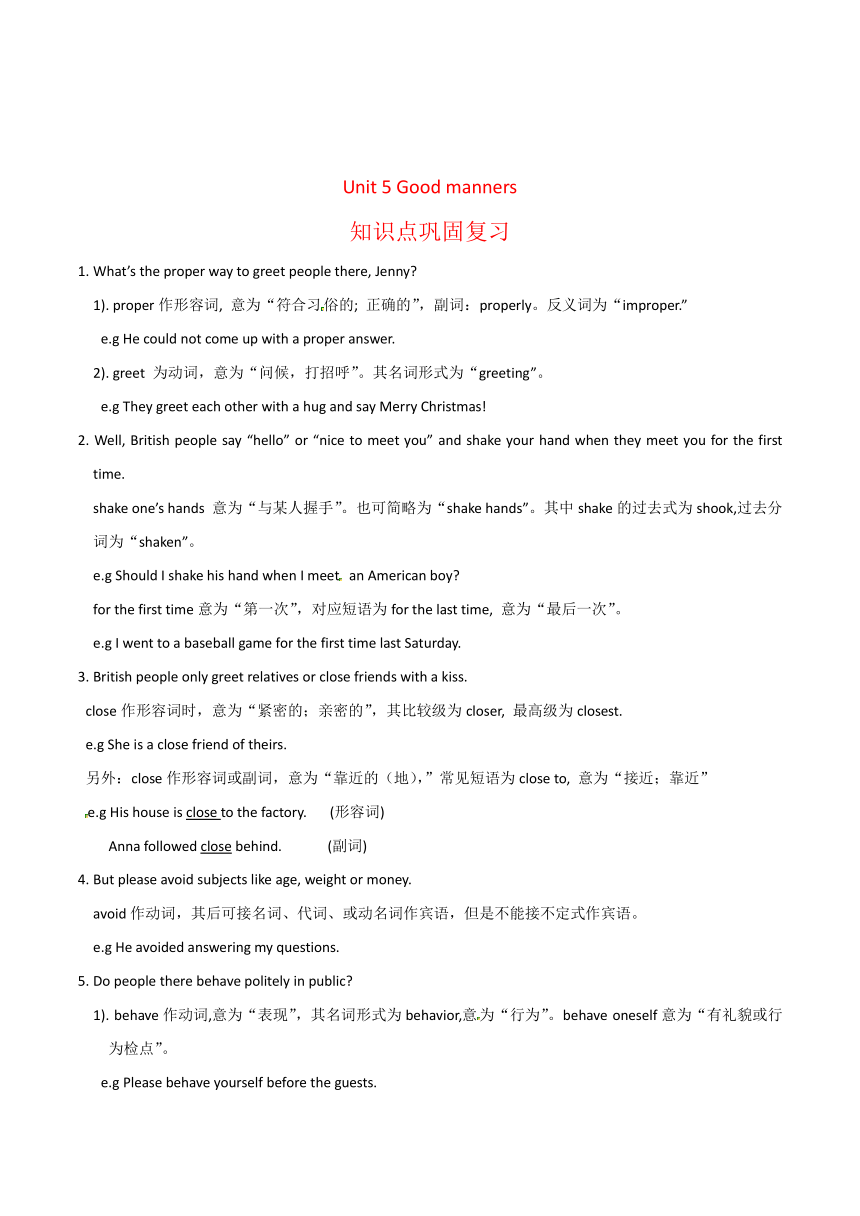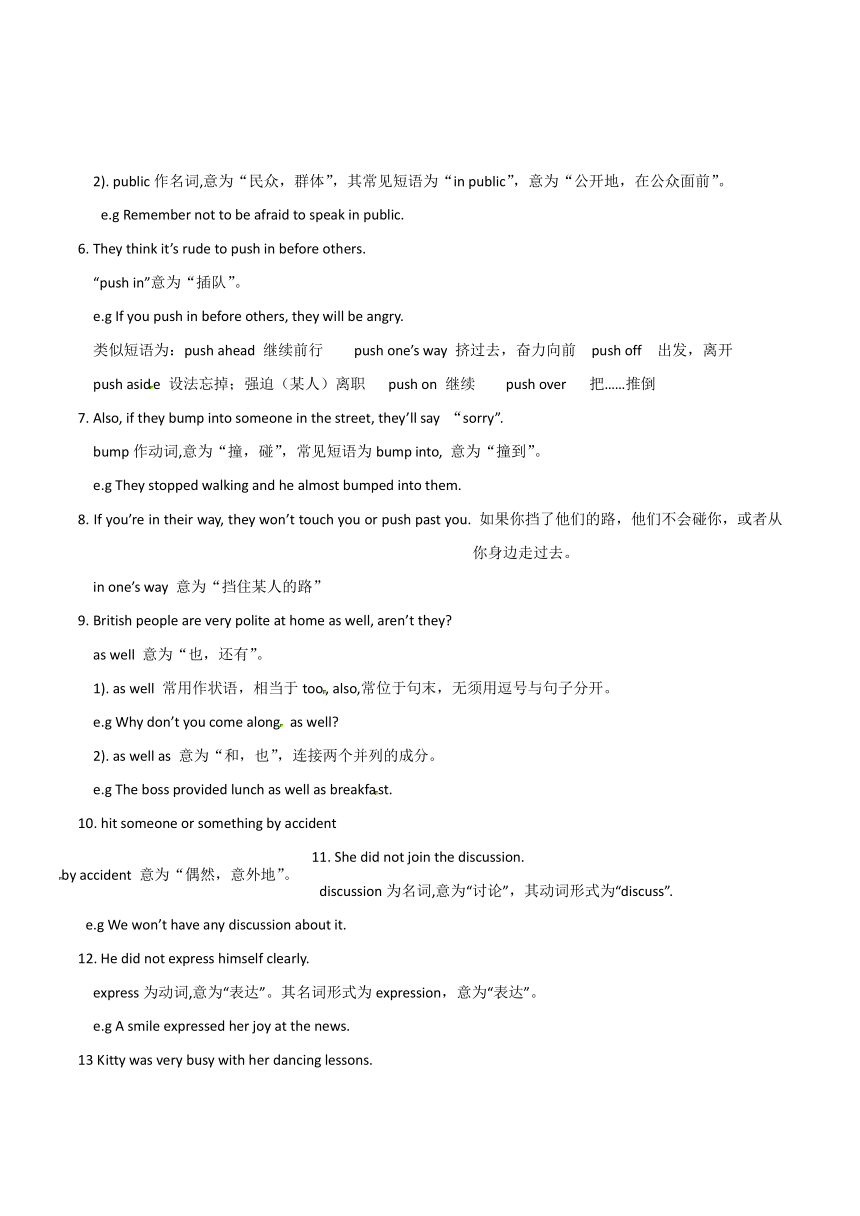牛津译林版八年级下册期末复习Unit5 Good manners知识点汇总
文档属性
| 名称 | 牛津译林版八年级下册期末复习Unit5 Good manners知识点汇总 |  | |
| 格式 | zip | ||
| 文件大小 | 17.6KB | ||
| 资源类型 | 教案 | ||
| 版本资源 | 牛津译林版 | ||
| 科目 | 英语 | ||
| 更新时间 | 2016-06-20 22:44:02 | ||
图片预览


文档简介
Unit
5
Good
manners
知识点巩固复习
1.
What’s
the
proper
way
to
greet
people
there,
Jenny
1).
proper作形容词,
意为“符合习俗的;
正确的”,副词:properly。反义词为“improper.”
e.g
He
could
not
come
up
with
a
proper
answer.
2).
greet
为动词,意为“问候,打招呼”。其名词形式为“greeting”。
e.g
They
greet
each
other
with
a
hug
and
say
Merry
Christmas!
2.
Well,
British
people
say
“hello”
or
“nice
to
meet
you”
and
shake
your
hand
when
they
meet
you
for
the
first
time.
shake
one’s
hands
意为“与某人握手”。也可简略为“shake
hands”。其中shake的过去式为shook,过去分词为“shaken”。
e.g
Should
I
shake
his
hand
when
I
meet
an
American
boy
for
the
first
time意为“第一次”,对应短语为for
the
last
time,
意为“最后一次”。
e.g
I
went
to
a
baseball
game
for
the
first
time
last
Saturday.
3.
British
people
only
greet
relatives
or
close
friends
with
a
kiss.
close作形容词时,意为“紧密的;亲密的”,其比较级为closer,
最高级为closest.
e.g
She
is
a
close
friend
of
theirs.
另外:close作形容词或副词,意为“靠近的(地),”常见短语为close
to,
意为“接近;靠近”
e.g
His
house
is
close
to
the
factory.
(形容词)
Anna
followed
close
behind.
(副词)
4.
But
please
avoid
subjects
like
age,
weight
or
money.
avoid作动词,其后可接名词、代词、或动名词作宾语,但是不能接不定式作宾语。
e.g
He
avoided
answering
my
questions.
5.
Do
people
there
behave
politely
in
public
1).
behave作动词,意为“表现”,其名词形式为behavior,意为“行为”。behave
oneself意为“有礼貌或行为检点”。
e.g
Please
behave
yourself
before
the
guests.
2).
public作名词,意为“民众,群体”,其常见短语为“in
public”,意为“公开地,在公众面前”。
e.g
Remember
not
to
be
afraid
to
speak
in
public.
6.
They
think
it’s
rude
to
push
in
before
others.
“push
in”意为“插队”。
e.g
If
you
push
in
before
others,
they
will
be
angry.
类似短语为:push
ahead
继续前行
push
one’s
way
挤过去,奋力向前
push
off
出发,离开
push
aside
设法忘掉;强迫(某人)离职
push
on
继续
push
over
把……推倒
7.
Also,
if
they
bump
into
someone
in
the
street,
they’ll
say
“sorry”.
bump作动词,意为“撞,碰”,常见短语为bump
into,
意为“撞到”。
e.g
They
stopped
walking
and
he
almost
bumped
into
them.
8.
If
you’re
in
their
way,
they
won’t
touch
you
or
push
past
you.
如果你挡了他们的路,他们不会碰你,或者从你身边走过去。
in
one’s
way
意为“挡住某人的路”
9.
British
people
are
very
polite
at
home
as
well,
aren’t
they
as
well
意为“也,还有”。
1).
as
well
常用作状语,相当于too,
also,常位于句末,无须用逗号与句子分开。
e.g
Why
don’t
you
come
along
as
well
2).
as
well
as
意为“和,也”,连接两个并列的成分。
e.g
The
boss
provided
lunch
as
well
as
breakfast.
10.
hit
someone
or
something
by
accident
by
accident
意为“偶然,意外地”。
11.
She
did
not
join
the
discussion.
discussion为名词,意为“讨论”,其动词形式为“discuss”.
e.g
We
won’t
have
any
discussion
about
it.
12.
He
did
not
express
himself
clearly.
express为动词,意为“表达”。其名词形式为expression,意为“表达”。
e.g
A
smile
expressed
her
joy
at
the
news.
13
Kitty
was
very
busy
with
her
dancing
lessons.
be
busy
with
sth=be
busy
doing
sth
e.g
He
is
busy
with
his
homework.=He
is
busy
doing
his
homework.
14.
Help
explain
things
and
give
us
useful
information.
explain作及物动词,意为“解释”,后可带双宾语,即explain
sb
sth=explain
sth
to
sb
e.g
The
lawer
explained
the
new
law
to
us.
15.
Keep
us
safe
from
danger.
keep
…from
意为“阻止……做……,保护……免受”,from后接名词、代词或者动名词作宾语。
e.g
You’d
better
keep
your
children
from
going
out
at
night.
16.warn
us
not
to
do
something
warn意为“警告”,warn
sb
to
do
sth
意为“警告某人做某事”。
e.g
The
police
warned
us
not
to
go
out
at
night..
17.everybody
will
be
lucky
or
successful
sometime
in
their
life
注意区别sometime,
some
time,
sometimes,
和sometimes的用法:
sometime意为“某个时候”,可指过去或将来的某个时间。
e.g
We
will
take
our
holiday
sometime
in
August.
some
time
还可意为“一段时间”
e.g
We’ll
stay
in
Hong
Kong
for
some
time.
sometimes意为“有时候”
e.g
He
sometimes
has
a
walk
after
supper.
some
times意为“几次”
e.g
I
have
been
to
Beijing
some
times.
18.
risk
losing
everything
all
at
one
time
risk作动词,意为“冒险做”,risk
doing
sth
意为“冒险做某事”。
常见短语为:at
the
risk
of…
意为“冒着……危险”。
19.
When
one
bad
thing
happens
to
you,
other
bad
things
happen
soon
after
soon
after
意为“不久之后”
e.g
Soon
after
we
found
that
she
was
a
good
student.
20.
practice
makes
perfect
熟能生巧
practice为不可数名词,意为“练习;训练;实践”。常见短语为:in
practice,意为“实际上,事实上”
e.g
But
in
practice
things
are
very
difficult.
practice作及物动词,也写作practise,意为“练习”,后接名词、代词或者动名词作宾语。
21.Above
all,
when
you
are
sitting
at
the
table,
you
should
not
start
until
everyone
is
ready...
above
all
意为“重要的是,首要的是”
5
Good
manners
知识点巩固复习
1.
What’s
the
proper
way
to
greet
people
there,
Jenny
1).
proper作形容词,
意为“符合习俗的;
正确的”,副词:properly。反义词为“improper.”
e.g
He
could
not
come
up
with
a
proper
answer.
2).
greet
为动词,意为“问候,打招呼”。其名词形式为“greeting”。
e.g
They
greet
each
other
with
a
hug
and
say
Merry
Christmas!
2.
Well,
British
people
say
“hello”
or
“nice
to
meet
you”
and
shake
your
hand
when
they
meet
you
for
the
first
time.
shake
one’s
hands
意为“与某人握手”。也可简略为“shake
hands”。其中shake的过去式为shook,过去分词为“shaken”。
e.g
Should
I
shake
his
hand
when
I
meet
an
American
boy
for
the
first
time意为“第一次”,对应短语为for
the
last
time,
意为“最后一次”。
e.g
I
went
to
a
baseball
game
for
the
first
time
last
Saturday.
3.
British
people
only
greet
relatives
or
close
friends
with
a
kiss.
close作形容词时,意为“紧密的;亲密的”,其比较级为closer,
最高级为closest.
e.g
She
is
a
close
friend
of
theirs.
另外:close作形容词或副词,意为“靠近的(地),”常见短语为close
to,
意为“接近;靠近”
e.g
His
house
is
close
to
the
factory.
(形容词)
Anna
followed
close
behind.
(副词)
4.
But
please
avoid
subjects
like
age,
weight
or
money.
avoid作动词,其后可接名词、代词、或动名词作宾语,但是不能接不定式作宾语。
e.g
He
avoided
answering
my
questions.
5.
Do
people
there
behave
politely
in
public
1).
behave作动词,意为“表现”,其名词形式为behavior,意为“行为”。behave
oneself意为“有礼貌或行为检点”。
e.g
Please
behave
yourself
before
the
guests.
2).
public作名词,意为“民众,群体”,其常见短语为“in
public”,意为“公开地,在公众面前”。
e.g
Remember
not
to
be
afraid
to
speak
in
public.
6.
They
think
it’s
rude
to
push
in
before
others.
“push
in”意为“插队”。
e.g
If
you
push
in
before
others,
they
will
be
angry.
类似短语为:push
ahead
继续前行
push
one’s
way
挤过去,奋力向前
push
off
出发,离开
push
aside
设法忘掉;强迫(某人)离职
push
on
继续
push
over
把……推倒
7.
Also,
if
they
bump
into
someone
in
the
street,
they’ll
say
“sorry”.
bump作动词,意为“撞,碰”,常见短语为bump
into,
意为“撞到”。
e.g
They
stopped
walking
and
he
almost
bumped
into
them.
8.
If
you’re
in
their
way,
they
won’t
touch
you
or
push
past
you.
如果你挡了他们的路,他们不会碰你,或者从你身边走过去。
in
one’s
way
意为“挡住某人的路”
9.
British
people
are
very
polite
at
home
as
well,
aren’t
they
as
well
意为“也,还有”。
1).
as
well
常用作状语,相当于too,
also,常位于句末,无须用逗号与句子分开。
e.g
Why
don’t
you
come
along
as
well
2).
as
well
as
意为“和,也”,连接两个并列的成分。
e.g
The
boss
provided
lunch
as
well
as
breakfast.
10.
hit
someone
or
something
by
accident
by
accident
意为“偶然,意外地”。
11.
She
did
not
join
the
discussion.
discussion为名词,意为“讨论”,其动词形式为“discuss”.
e.g
We
won’t
have
any
discussion
about
it.
12.
He
did
not
express
himself
clearly.
express为动词,意为“表达”。其名词形式为expression,意为“表达”。
e.g
A
smile
expressed
her
joy
at
the
news.
13
Kitty
was
very
busy
with
her
dancing
lessons.
be
busy
with
sth=be
busy
doing
sth
e.g
He
is
busy
with
his
homework.=He
is
busy
doing
his
homework.
14.
Help
explain
things
and
give
us
useful
information.
explain作及物动词,意为“解释”,后可带双宾语,即explain
sb
sth=explain
sth
to
sb
e.g
The
lawer
explained
the
new
law
to
us.
15.
Keep
us
safe
from
danger.
keep
…from
意为“阻止……做……,保护……免受”,from后接名词、代词或者动名词作宾语。
e.g
You’d
better
keep
your
children
from
going
out
at
night.
16.warn
us
not
to
do
something
warn意为“警告”,warn
sb
to
do
sth
意为“警告某人做某事”。
e.g
The
police
warned
us
not
to
go
out
at
night..
17.everybody
will
be
lucky
or
successful
sometime
in
their
life
注意区别sometime,
some
time,
sometimes,
和sometimes的用法:
sometime意为“某个时候”,可指过去或将来的某个时间。
e.g
We
will
take
our
holiday
sometime
in
August.
some
time
还可意为“一段时间”
e.g
We’ll
stay
in
Hong
Kong
for
some
time.
sometimes意为“有时候”
e.g
He
sometimes
has
a
walk
after
supper.
some
times意为“几次”
e.g
I
have
been
to
Beijing
some
times.
18.
risk
losing
everything
all
at
one
time
risk作动词,意为“冒险做”,risk
doing
sth
意为“冒险做某事”。
常见短语为:at
the
risk
of…
意为“冒着……危险”。
19.
When
one
bad
thing
happens
to
you,
other
bad
things
happen
soon
after
soon
after
意为“不久之后”
e.g
Soon
after
we
found
that
she
was
a
good
student.
20.
practice
makes
perfect
熟能生巧
practice为不可数名词,意为“练习;训练;实践”。常见短语为:in
practice,意为“实际上,事实上”
e.g
But
in
practice
things
are
very
difficult.
practice作及物动词,也写作practise,意为“练习”,后接名词、代词或者动名词作宾语。
21.Above
all,
when
you
are
sitting
at
the
table,
you
should
not
start
until
everyone
is
ready...
above
all
意为“重要的是,首要的是”
